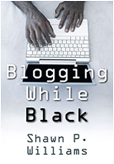Shawn Williams – Dallas Morning News: Citizen journalists as prospective partners
Here’s my Dallas Morning News Citizen Journalism Column that appeared in Sunday’s Points section. I’ve included pictures from the Poynter Institute Sense Making conference that I’ve been talking about for the last few weeks and reference in the column. Thanks to Nicole Stockdale at the Morning News for allowing my thought to be published.

Poynter Institute Sense Making Conference
When are we? It’s a popular question on ABC’s drama series Lost, since characters now realize that they are traveling through time. The question also seems fitting as a new era in media is thrust upon us and we look to decipher where one period ends and another begins.

Mac to PC Ratio was at least 5 to 1
I recently attended a “Sense Making” seminar hosted by the Poynter Institute, a journalism school affiliated with the St. Petersburg Times. Kelly McBride, who facilitated the weeklong meeting, assembled a diverse group of bloggers, traditional journalists and everyday citizens to discuss the sea change affecting every aspect of media. The project looks to chart a new course through the rough waters that lie ahead.
dees agreed on one sobering point: Media as we’ve known it is dead. Those of us who share this sentiment do not seek to diminish the effort or cheapen the value of professional journalists, as they continue to make vital contributions. Truth be told, without the work of everyday reporters, the blogosphere would have little to comment on; Web feed aggregators would have little to share.

Porter Baynes, Anna John, Alexis Ohanian, Drew Curtis
Ameritocracy, Sepia Mutiny, Reddit, Fark.com
But the conversation in St. Petersburg was acutely focused on what’s next and how we prepare for the gaps in coverage that are coming. Many of us faced questions that hadn’t been asked of us before. What values will drive the new media reality? Will transparency replace the revered journalistic principle of objectivity? Who’s going to fund this revolution (and will it be televised)?
Here lies the biggest challenge: There are many more questions than answers regarding the spaces being shared by journalists and bloggers, writers and activists, citizens and politicians. But one answer is clear: Newsrooms must begin to view citizen journalists as prospective partners rather than impending threats. That will mean listening to ideas, engaging in debate and responding to the needs of readers, viewers and listeners. Merely pushing out content on Facebook and Twitter won’t cut it.

Chris Rabb – Afro-Netizen.com
The future media model will depend on innovative collaborations and shared responsibilities. Stories may be written with 20 authors, all of whom share in the credit and each of whom has a byline. Awards will mean less; public trust will mean more.
The paradigm shift will call for the public to re-examine its role, as well. The boundaries between producer and consumer will become amorphous. If a story I’m interested in isn’t covered, the fault may lie with me and every other regular Joe involved because we weren’t there with our Flip video cameras and MP3 recorders. The days of demanding professional media coverage are coming to a close now that everyone is one UStream account and a webcam away from producing their own newscast. Technology is the true equalizer.

Shawn P. and Latoya Peterson – Racialicious.com
As I watch journalists debate the fate of their profession on television and in print, I wonder how many of them have faith in the noble values and ideals that have emerged in their profession over the last 400 years. Because if newspaper-types really believe in this most American of institutions – dating back to Benjamin Franklin and his brother James – they know that journalism will persist even if the salaries of columnists and opinion-makers dry up.
As we embark on this journey of identifying new business models and missions, I remain extremely hopeful because this media evolution is driven by individuals, the same bottom-up archetype that recently changed the political landscape. Once we sort through all the rhetoric, it really boils down to this: How will all of this affect our democracy?
In our political democracy, the idea that every vote counts is fundamental – even though one vote rarely determines the outcome of an election. In our journalistic democracy, every story, every post, every comment (OK, maybe not every comment) will help us get to the real story and bring us closer to the truth. More Americans than at any point in history will make a contribution to the greater good through some form of reporting or writing.
Upon leaving the Poynter Institute I felt just as I do after an episode of Lost. I’m never exactly sure how what I’ve witnessed fits together, and I have no idea how the story is going to end. Yet I can’t wait until the next episode.




